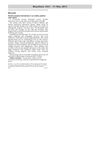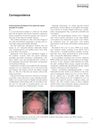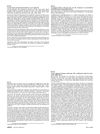 January 2019 in “International Journal of Trichology”
January 2019 in “International Journal of Trichology” A woman lost all her hair in one day, was diagnosed with a rare type of hair loss, and regrew it in 12 weeks with treatment.
 25 citations,
December 2017 in “Facial Plastic Surgery”
25 citations,
December 2017 in “Facial Plastic Surgery” Combination therapy with steroids and pimecrolimus improved or stabilized hair loss in most patients with Frontal Fibrosing Alopecia, who also had a high rate of hypothyroidism.

Seborrheic dermatitis and dandruff are often treated with antifungal and anti-inflammatory medications, which can reduce symptoms and yeast growth on the scalp.
 1 citations,
June 2014 in “Serbian Journal of Dermatology and Venereology”
1 citations,
June 2014 in “Serbian Journal of Dermatology and Venereology” A woman with discoid lupus improved with treatment after being misdiagnosed with a different hair loss condition.
 October 2016 in “Elsevier eBooks”
October 2016 in “Elsevier eBooks” Common noncancerous skin diseases have various treatments, including topical applications, light therapy, surgery, and medications, with psychological support being important.
 5 citations,
July 2003 in “Drug Development Research”
5 citations,
July 2003 in “Drug Development Research” Fluridil promotes hair growth safely and effectively for androgenetic alopecia.
16 citations,
October 2013 in “Irish Veterinary Journal” Oral feline interferon-omega improved symptoms in diabetic cats with gingivostomatitis.
 1 citations,
January 2023 in “Research Square (Research Square)”
1 citations,
January 2023 in “Research Square (Research Square)” A woman's vitiligo improved with tofacitinib treatment, and her skin color remained even after stopping the medication, but there are concerns about cancer risk.
 4 citations,
January 2022 in “Current pharmaceutical design”
4 citations,
January 2022 in “Current pharmaceutical design” Microsponges delivery system is a safe, versatile method for controlled drug release in various treatments.
January 2023 in “Pharmaceutics” AA–TF#15 significantly promotes hair regrowth and could be an effective treatment for androgenic alopecia.
 May 2013 in “Reactions Weekly”
May 2013 in “Reactions Weekly” Using minoxidil can cause severe skin reactions in some people.
 2 citations,
January 2019 in “Springer eBooks”
2 citations,
January 2019 in “Springer eBooks” The conclusion is that different blood diseases cause specific oral symptoms and require varied treatments to manage these symptoms and improve patient health.
1 citations,
December 2020 in “Case reports in dermatological medicine” A patient with pemphigus vulgaris improved significantly after treatment for an additional viral skin infection.
 May 2024 in “Indian Journal of Dermatology”
May 2024 in “Indian Journal of Dermatology” Androgenetic alopecia in men is genetic and linked to health issues like obesity and heart disease, with treatments including minoxidil, finasteride, and hair transplants.
1 citations,
September 2022 in “Journal of the Egyptian Womenʼs Dermatologic Society” A rare scalp infection in a 66-year-old woman was successfully treated, leading to full hair regrowth.
 17 citations,
April 2006 in “Dermatologic Clinics”
17 citations,
April 2006 in “Dermatologic Clinics” Older women face various skin issues like dryness and thinning, and treatments are available but can have side effects; proper skin care and legal health decisions are important.
May 2018 in “Hair transplant forum international” Topical finasteride promotes hair growth with minimal side effects but needs more research for women and optimal use.
78 citations,
August 2014 in “Anais Brasileiros de Dermatologia” New vitiligo treatments focus on controlling immune damage and restoring skin color.
 August 2009 in “Expert Review of Dermatology”
August 2009 in “Expert Review of Dermatology” Pregnancy can cause skin changes and conditions that need correct diagnosis and treatment for the health of the mother and baby.
 124 citations,
October 2019 in “Frontiers in Immunology”
124 citations,
October 2019 in “Frontiers in Immunology” Janus kinase inhibitors are promising treatments for autoimmune skin diseases like eczema and psoriasis.
 12 citations,
November 2011 in “International Journal of Dermatology”
12 citations,
November 2011 in “International Journal of Dermatology” A woman developed a scalp condition from using minoxidil, which improved with a different treatment but left scarring.
1 citations,
August 2024 in “Cosmetics” Melasma treatment is difficult, but combination therapies and personalized plans show promise.
 February 2009 in “Journal of The American Academy of Dermatology”
February 2009 in “Journal of The American Academy of Dermatology” Pulsed dye laser treatment was effective for a skin condition resistant to other treatments.
 5 citations,
January 2018 in “Springer eBooks”
5 citations,
January 2018 in “Springer eBooks” Acne in dark skin is influenced by environmental factors and can lead to hyperpigmentation, with various treatment options available.
 7 citations,
December 2019 in “American Journal of Clinical Dermatology”
7 citations,
December 2019 in “American Journal of Clinical Dermatology” Topical therapies show promise for hair loss and acne treatment with minimal side effects.
1 citations,
March 2022 in “JAAD case reports” Methotrexate injection site reactions are rare but can be managed by changing injection sites and using topical treatments.
1 citations,
November 2023 in “Journal of Ayurveda and Integrative Medicine” Ashwagandha serum improves hair health and quality of life in people with hair loss.
 16 citations,
June 2021 in “Journal of Dermatological Treatment”
16 citations,
June 2021 in “Journal of Dermatological Treatment” Minoxidil effectively treats hair loss, especially androgenetic alopecia, but needs more research for better understanding.
 March 2021 in “Journal of Maxillofacial and Oral Surgery”
March 2021 in “Journal of Maxillofacial and Oral Surgery” Beard hair can be used for hair transplants in severe alopecia cases, with minimal complications and good results.
 159 citations,
March 2014 in “Journal of The American Academy of Dermatology”
159 citations,
March 2014 in “Journal of The American Academy of Dermatology” Some skin medications are safe during pregnancy and breastfeeding, but others can harm the baby and should be avoided.





















